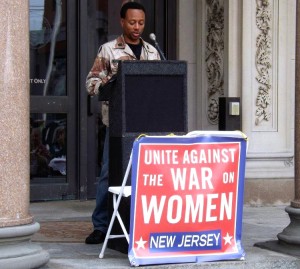Thank you for this opportunity to speak to you today. I am honored to be here on behalf of United for Peace and Justice and as a board member of Veterans For Peace. I applaud all of you for coming out today to stand up for what is right. To stand up for unity, dignity and justice for all. The theme of today is to push back on conservative attacks on women and to demand government policies that are supportive of women. This is extremely important as many of these conservative positions are a throwback to a past era when women had few choices about work, their health and their identity. It is clear that we must advocate for policies that are helpful and stop polices that are harmful to women. At times it appears Republicans are intent on undermining women. Just yesterday Republican House members passed a bill to extended low interest rates for student loans but pay for it by cutting funding for medical services to women. However I want to warn us to remember that there are U.S. policies that negatively affect women which have support cross party lines. Many of these policies impact women in the U.S. and around the world. I am talking about U.S. war policies and I am here to be a witness to the impact of war on women’s lives.
A reality of war is that many more civilians are killed and injured in it than the combatants. Of these civilian victims the overwhelming majority are women and children. Women and children are more directly impacted by the disruption of services and community caused by war. Violence becomes the norm and women become targets of aggression. Children cannot attend school and women cannot travel alone to take care of their families.
Rape is an ancient tool of war used by armies to humiliate and subjugate their enemy. This continues to be true today. Rapes, prostitution and the general sex trade industry increase in areas of conflict.
The violence faced by women in war does not end with the civilian population in the crossfire. Women in the U.S. military are facing an epidemic of violence committed against them by their fellow service members. This should not come as a complete surprise as women across our nation face and epidemic of violence and sexual assault.
The U.S. Army has reported that the rate of violent sexual crime has increased 64% since 2006 and noted that rape; sexual assault and forced sodomy were the most frequent violent crimes in 2011. Women compromise 14% of the Army ranks but account for 95% of all sex crime victims. The attacks were so bad that at one point in Iraq many women stopped drinking water after 4 pm so that they would not have to go to the latrine late at night. As a result of not drinking water in 120 degree or hotter heat, a number of women died in their sleep of dehydration.
I have seen studies that claim 1 in 3 women in the military have experienced some form of sexual assault during their career and just like in general U.S. society the overwhelming number of sexual assault offenders were friends or a casual acquaintance of the survivors.
But the negative impact of war on women does not end there. Our nation has been at continual war since 2011 and has spent over a trillion dollars to conduct war. Today we find ourselves in a sluggish and very weak economy with millions out of work and human services cut. Here again we find that those most directly impacted are women and children. Single mothers who have lost their jobs must continue to try to take care of their families. Social services have been cut that many families relied on. Perhaps most important is that money that has been used for bombs, bullets and to take life could have been used to invest in job training and human needs services to improve women and children’s health and quality of life. Dr. Martin Luther King expressed in 1967 that the bombs in Vietnam explode at home. This continues to be true for us today. The resources used for war are opportunities lost to improve the lives of women and children here.
The war on women includes U.S. wars around the world. These wars profoundly impact the lives of women where the wars are conducted and they diminish the opportunities for women here at home. These wars perpetuate violence as a norm and decrease women’s personal safety.
In closing I say to you that to fully address attacks on women on all levels our nation must turn from being the world’s leader in war making to peacemaking. I say specifically to men that we must step up and hold each other accountable for our actions and attitudes with women and we must take responsibility for moving our nation away from aggression and towards peaceful conflict resolution.
Power to the people, power to the peaceful.









